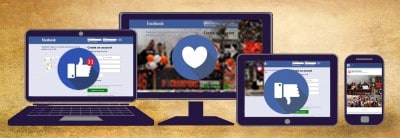New Delhi, Dec 12 : There has been a substantial increase in social media profiles by Indians who hide their real names, photos and personally identifiable information (PII), in order to not only harness free speech but also conduct malicious and harmful activities, a new report warned on Saturday.
The platform being used the most by Indian users who want to keep their identities anonymous are Facebook (76 per cent), YouTube (60 per cent), Instagram (47 per cent) and Twitter (28 per cent), according to the data provided by a global cybersecurity company Kaspersky.
While it may be frowned upon at first glance, the use of “nameless and faceless profiles” is two-pronged.
“The results unmasked how this reality allow individuals to chase their passions and to harness free speech but at the same time to conduct malicious and harmful activities”.
“From the initial purpose of finding and connecting with friends and families, social media has evolved and will continue to evolve in unprecedented ways,” said Dipesh Kaura, General Manager for South Asia, Kaspersky.
“It has played a key role on how we socialise and identify with each other, but now, we have arrived at a fork in the road where virtual profiles of both individuals and companies are being used as a parameter for judgment,” Kaura said in a statement.
Almost three in 10 users in Asia Pacific (APAC) admitted to having a social media profile without their real identities.
Conducted in November with 1,240 respondents from the region, the “Digital Reputation” research showed that the power of anonymity is being used the most in Southeast Asia at 35 per cent, followed by India at 28 per cent and Australia at 20 per cent.
More than half (59 per cent) of those surveyed stated that they use anonymous accounts to exercise their freedom of speech without affecting their reputation, while 53 per cent wanted to indulge in their secret interests that they were not too keen on having their friends find out about.
The consumers in the APAC region are increasingly becoming aware of the reputation they are building online and its importance to their real lives.
“On this basis, it is not surprising that 49 per cent of the respondents will check the social media accounts of a brand or a company before purchasing their goods or services,” the report stated.
“The consumers now hold companies accountable for their online reputation, in the same way that individuals’ behaviour on social media is now being used to determine one’s credit score, to screen one’s employability, and even to either reject or approve one’s Visa request,” Kaura elaborated.
Disclaimer: This story is auto-generated from IANS service.

